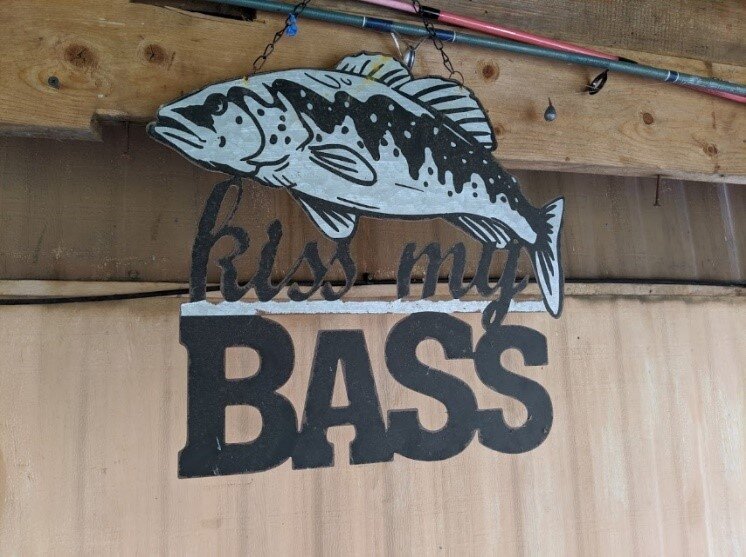A Bad Day Fishing is Better Than… Well, You Know the Rest
A bad day fishing is better than a good day at work! This is a phrase I have known since I was a kid, long before I became an avid angler. We have all heard the fishing puns. People who have no interest in fishing have heard the adages and read the bumper stickers. Fishing jokes and phrases permeate American culture and language. But why? I can’t think of another sport that is so intertwined with American colloquialism. Maybe baseball. But until I started fishing, I never realized how fully integrated cheesy aphorisms are in fishing lingo. Terrible puns are as important to fishing as they are to pet stores and the adult film industry. To forewarn you, this article will be more of a linguistic and etymological exercise than a fish tail. Fish tale. Damnit.
My first notion of writing an article about fishing puns was to completely declare war them. I was ready to accuse anyone of having a sign that says Kiss My Bass! or a bumper sticker that says I’d Rather Be Fishing! of having the sense of humor equivalent to that of a dead raccoon. However, I think my original hatred of fishing puns was an insecure projection. I am baring a dark part of my soul to you when I admit that I secretly love hokey fishing aphorisms. I have been collecting them like stamps since I’ve started fishing and I’m more than ready to dole one out, even in the flimsiest of pretexts.
“Mark, how was your weekend?”
“Work is for people who don’t know how to fish!”
“… Great. Did you catch anything?”
“Just a buzz!”
“Hm. Please don’t talk to me for the rest of the workday.”
This also explains why I do a lot of fishing alone.
While exploring my love/hate relationship with fishing quips, I wanted to examine exactly why fishing is so rife with corndog phrases that plenty of non-anglers are familiar with. I’m no linguistic expert, but I think the fact that fishing is such a “dad” sport has a lot to do with it. Fishing might be the most “dad” activity out there, perhaps standing shoulder to shoulder with amateur BBQ-ing and having a “world-famous” chili recipe. I’m not a dad, so I’m not particularly well versed in these matters, but observations of various dads, their vernacular, and leisure time activities, have led me to these theories. I’m not explicitly calling fishing, or dads, lame or uncool. However, I’m pretty sure fishing has a negative impact on your street cred. Especially if you wear a Goddamn bucket hat. You have crossed into the shadow realms of being a fishing dad at peak levels of corncobbery once you wear the bucket hat. I’m afraid that it’s a terminal condition.
Fishing lies in the center of the Venn diagram of terrible jokes and being a dad. This is an unfortunate but very natural place to be, as it is a well-known trope that dads hold the heavyweight champion belt of garbage puns. Most of us are familiar with the term, “Dad Jokes.” These are the most bottom of the barrel, palm-to-the-face, puns known to mankind. I won’t delve into any theories pertaining to why a man’s sense of humor takes a complete nosedive once he fosters offspring. This would be an utter waste of our time. But just as Dad Jokes have been realized as a cultural phenomenon, I believe horrible fishing phraseology has ridden its coattails. Society sees a trickledown effect with eye-rolling fishing verbiage as dads have a significant impact factor on cultural linguistics. However, I don’t just blame the concept of “dads” for why fishing references pervade English. These waters run deeper.
Fishing, not necessarily angling, was a more integrated part of society in the past. Ancient cultures relied on fishermen to provide food for the table. This is entirely lost on us in modern times, where you can simply walk down to CoGo’s and buy a dozen Toblerone chocolate bars for dinner. This is in contrast to premodern days when expectations for eating hinged on whether or not the fisherman were able to produce results. Ancient coastal societies probably had a much closer relationship with fish, and it would only be natural for fishing terminology to work its way into common parlance.
Even Jesus wasn’t above terrible fishing banter. In Luke 5:10 he asks of Paul Simon, “Don’t be afraid; from now on you will fish for people.” I’m no theologian, but I’m pretty sure Jesus wasn’t asking his apostles to catch people in nets. He probably wanted them to go spread the Message. Also, I’m confident Paul Simon was never one of Jesus’ apostles, but the song You Can Call Me Al is on biblical levels of greatness. Anyway, before I go completely off the rails, I doubt the aforementioned Bible passage is the oldest fishing metaphor in Western history. I’m sure the Romans and Phoenicians had some real side-splitters about mackerel or something.
So please, go ahead and enjoy your fishing puns, everybody. If the infinite power of Christ can teach us anything, it’s that hammy fishing references are just fine. I think the healthiest way to indulge in these jokes is to consider them a guilty pleasure. While I believe that the occasional use of fishing puns can be entertaining, in a self-flagellating sort of way, taking it too far and putting bumper stickers on your car that say, “Life Is Good and Fishin’ Makes It Even Better!” is a short step away from wearing a bucket hat and tucking your t-shirt into chino shorts.
Tight lines everyone.
Parting Thought
If you give a man a fish, he will eat for a day. If you teach a man to fish, he will sit in a boat and drink beer all day.



